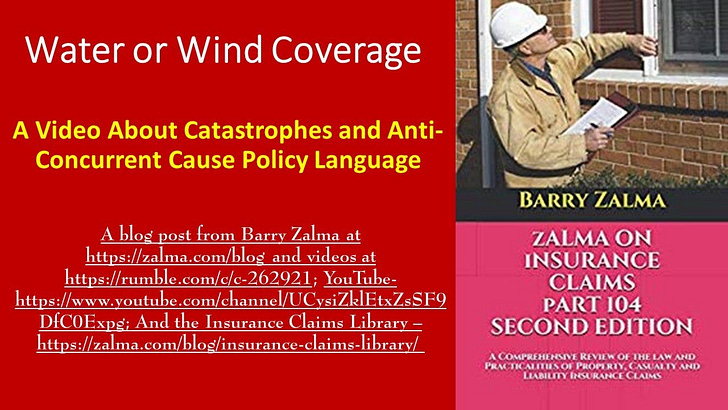Water & Wind Damage
A Video About Catastrophes and Anti-Concurrent Cause Policy Language
Read the full article at https://www.linkedin.com/pulse/water-wind-coverage-barry-zalma-esq-cfe and see the full video at https://rumble.com/vi6k79-water-or-wind-coverage.html and at
and at https://zalma.com/blog plus more than 3750 posts.
The United States Court of Appeal, Fifth Circuit entered an important decision with regard to water damage and insurance policy coverage for claims resulting from water damage and catastrophe losses. In Leonard v. Nationwide, 499 F.3d 419, 37 A.L.R. 6th 785 (2007) the first of the Katrina cases to go to trial, found that anti-concurrent-causation clause was not ambiguous; the clause was not invalid under Mississippi law; and
water damages exclusion unambiguously excluded damage caused to residence from storm surge.
The Leonards’ home lies twelve feet above sea level on the southernmost edge of Pascagoula, Mississippi, less than two hundred yards from the Mississippi Sound. Hurricane Katrina battered Pascagoula with torrential rain and sustained winds in excess of one hundred miles per hour. By midday, the storm had driven ashore a formidable tidal wave—also called a storm or tidal surge—that flooded the ground floor of the Leonards’ two-story home.
The Fifth Circuit found that the anti-concurrent causation “clause unambiguously excludes coverage for water damage ‘even if another peril”—e.g., wind— “contributed concurrently or in any sequence to cause the loss.’ The plain language of the policy leaves the district court no interpretive leeway to conclude that recovery can be obtained for wind damage that ‘occurred concurrently or in sequence with the excluded water damage.’”
For all these reasons, the Fifth Circuit “concluded that use of an anti-concurrent-cause clause to supplant the default causation regime is not forbidden by Mississippi caselaw (including the Camille cases which antedate such clauses), statutory law, or public policy. Because the anti-concurrent-causation clause is unambiguous and not otherwise voidable under state law, it withstood the claim of the Leonards.




